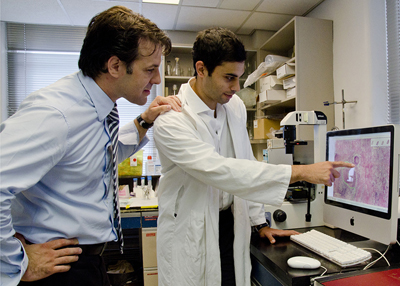RI-MUHC researchers ID new mode of cancer progression
“We are the first to identify this entirely new way that cancer spreads,” says senior author Dr. Lorenzo Ferri, MUHC director of the Division of Thoracic Surgery and the Upper Gastrointestinal (GI) Cancer Program. “What’s equally exciting is medications already exist that are being used for other non-cancer diseases, which may prevent this mechanism of cancer spread or metastasis.” According to Dr. Ferri, the next steps are to validate if these medicines will work for the prevention and treatment of cancer metastasis, and then to determine the optimal timing and dosing.
“Our first clue of this association was from our previous research, which showed that severe infection in cancer patients after surgery results in a higher chance that patients will have the cancer return in the form of cancer metastasis,” says Dr. Ferri who is also an Associate Member of the Rosalind and Morris Goodman Cancer Research Centre and Associate Professor in the Department of Oncology at McGill University. “This led us to investigate the cellular players in the infection, notably neutrophils, the first and most numerous of the white blood cells that are used by the immune system fight off infections.”
Dr. Ferri and his colleagues from McGill University and the University of Calgary used both cultured cells and mouse models of cancer to show that there is a relationship between infection, a white blood cell response (inflammation) and metastasis. A web-like network called Neutrophils Extracellular Traps (NETs), is produced by white blood cells (neutrophils) in response to an infection and this normally traps and kills invading pathogens, such as bacteria.
Read the full story on the MUHC’s website.
CBC News
Medical Xpress
Ottawa Citizen
July 1, 2013
